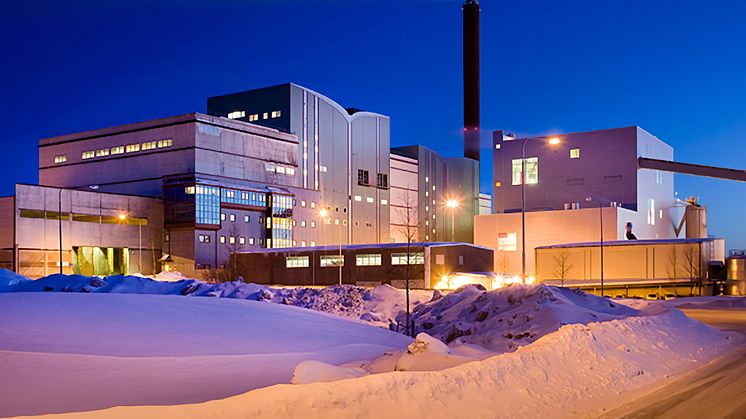
Press release -
Data science can help environmental industries and energy users
How can data science contribute to a more sustainable world? In his thesis defended at Umeå University, Sweden, Dong Wang has explored how data mining and explainable machine learning can be used to gain better process control strategies for environmental industries like wastewater treatment plants.
Our society has taken many measures to address environmental issues. For example, deploying wastewater treatment plants (WWTPs) to alleviate water pollution and the shortage of usable water and using waste-to-energy (WtE) plants to recover energy from waste and reduce its environmental impact.
However, managing these facilities is challenging because the processes are always complex and dynamic. This can prevent operators from understanding the processes comprehensively and accurately through traditional approaches. At the same time, with the development of the so-called Industry 4.0, large-volume and high-resolution data from automatic online monitoring have become much more available. These data usually provide abundant detailed information of process activities that can be utilized for optimizing process control. Similarly, data monitoring is also adopted by resource end users. For example, the energy consumption of commercial buildings is usually recorded for optimizing energy consumption behavior, eventually saving costs and reducing carbon footprint.
“In order to extract the desired information from massive recorded data, appropriate data science methods need to be employed” says Dong Wang. “The whole pipeline of data science implementation consists of multiple stages: formulating data-driven solutions, data preprocessing, analyzing data with particular algorithms, and employing results to support high-level decisions in various application scenarios.”
The overall objective of Dong Wang’s thesis work was to explore how data science can contribute to a more sustainable world from the perspectives of both improving the operation of environmental engineering processes and optimizing the activities of energy end users. The focus of data science in Dong Wang’s projects is data mining and explainable machine learning, incorporating e.g. Artificial Neural Networks, Random Forest, SHapley Additive exPlanations, Deep Embedding Clustering and Local Outlier Factor.
“My projects were part of the research and collaboration platform ‘Green Technology and Environmental Economics’ at Umeå University, which is aimed at resource efficiency and sustainability to support circular transition. In this context, I got the opportunity to have very close and fruitful collaborations with several companies in Sweden” says Dong Wang.
The results of his thesis can be used to solve these companies’ practical problems. The first two projects aimed to improve the process or effluent quality control at the full scale in Umeå WWTP of VAKIN. The third study was for identifying culprits in boiler failures in a WtE plant of Umeå Energi. The results can contribute to upgrading process control strategies to a more sophisticated level that is more precise and cost-effective than traditional approaches. A forth study together with Mestro AB investigated how to effectively detect the imperceptible energy consumption anomalies for keeping building systems efficient, safe, and robust.
“In addition to the benefits for the case study subjects, on a higher level, my thesis has yielded knowledge that can be applied in a much broader context of environmental processes and energy optimization applications,” says Dong Wang.
About the dissertation
On Tuesday January 18 Dong Wang, Department of Chemistry at Umeå University defends his dissertation titled How can data science contribute to a greener world? An exploration featuring machine learning and data mining for environmental facilities and energy end users. Swedish title: Hur kan datavetenskap bidra till en grönare värld? Studier med användande av maskininlärning och datamining för miljöanläggningar och energiförbrukning. The dissertation takes place at 13.00 in Glasburen, KBC Building and participants welcome digitally via Zoom. Faculty opponent is Professor Venkat Venkatasubramanian, Department of Chemical Engineering, Columbia University, USA.
Read the dissertation: urn:nbn:se:umu:diva-190259
Zoom-link dissertation defense: https://umu.zoom.us/j/69540899239
For more information, please contact:
Dong Wang, doctoral student, Department of Chemistry, Umeå University
Phone: +46- 76-0874792
Email: dong.wang@umu.se
Topics
Categories
Umeå University
Umeå University is one of Sweden’s largest institutions of higher education with over 36,000 students and 4,000 faculty and staff. The university is home to a wide range of high-quality education programmes and world-class research in a number of fields. Umeå University was also where the revolutionary gene-editing tool CRISPR-Cas9 was discovered that has been awarded the Nobel Prize in Chemistry.
At Umeå University, distances are short. The university's unified campus encourages academic meetings, an exchange of ideas and interdisciplinary co-operation, and promotes a dynamic and open culture in which students and staff rejoice in the success of others.


